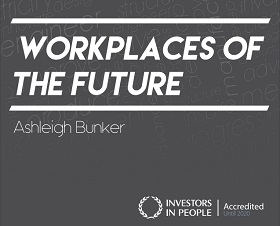Workplaces of the future
In May 2017, BSRIA launched Workplaces of the Future, written by workplace student Ashleigh Bunker. This insightful report contemplates the workplace needs and desires of the youth of today, aka millennials and Generation Z.
The study was undertaken as part of BSRIA’s INSPIRE project, which works with local schools, national and local politicians and the media to promote and change perceptions about STEM (science, technology, engineering and mathematics).
- Generation X is defined as anyone between 1960 – 1980.
- Generation Y also known as millennials, are people born from 1980 – 2000.
- Generation Z is anyone born after the year 2000.
The report considers how the advance of digital technologies is changing the way we work. Collaboration technologies are ushering in a next-generation workplace that is more productive, efficient and delivers meaningful cost savings to organisations of all sizes across the globe.
The office of the future may not even need to be a workplace in the accepted sense of the word. With new and more advanced mobile devices giving employees the freedom to work from anywhere, these technologies will continue to reshape the look and feel of the ‘office’. What will be the expectations of the occupiers and what will be the impact for designers, developers and those managing the workplace environment?
Ashleigh researched:
- How the workplace environment will affect the career choices of different generations.
- How the needs of the different generations will need to be met in the transitioning years.
- The benefits of providing a new workplace environment that meets the expectations of the millennial generation and beyond.
- The history of office layouts; offices of today; the next 10 years and next steps.
Key findings included:
- Technology has affected what millennials are like as employees. Generally, they want instant results making them more action orientated. Where the previous ideology was more 'eventually you get your dues', millennials want to work quickly and see results as equally as fast. This passion for instant results may make them seem impatient to older generations, but businesses will have to accommodate such characteristics.
- When generation Z walks into the office, they want to feel pride in their workplace not only for the design but also for the flexibility it will allow them. With the flexibility to work from anywhere, one will be working in a virtual world with colleagues in other countries and still be a in a functioning business. However, a problem on the horizon is that future offices could be too laid back.
- Millennials don’t want to work for just any company, they would prefer to earn less and work for a company with strong passions and morals.
- There is a desire to make the office look good. If the environment is not inspiring, the workers will not have pride in their workplace, nor will they feel inspired to work.
You can find out more and download the report here.
--BSRIA
[edit] Related articles on Designing Buildings Wiki
Featured articles and news
A case study and a warning to would-be developers
Creating four dwellings for people to come home to... after half a century of doing this job, why, oh why, is it so difficult?
Reform of the fire engineering profession
Fire Engineers Advisory Panel: Authoritative Statement, reactions and next steps.
Restoration and renewal of the Palace of Westminster
A complex project of cultural significance from full decant to EMI, opportunities and a potential a way forward.
Apprenticeships and the responsibility we share
Perspectives from the CIOB President as National Apprentice Week comes to a close.
The first line of defence against rain, wind and snow.
Building Safety recap January, 2026
What we missed at the end of last year, and at the start of this...
National Apprenticeship Week 2026, 9-15 Feb
Shining a light on the positive impacts for businesses, their apprentices and the wider economy alike.
Applications and benefits of acoustic flooring
From commercial to retail.
From solid to sprung and ribbed to raised.
Strengthening industry collaboration in Hong Kong
Hong Kong Institute of Construction and The Chartered Institute of Building sign Memorandum of Understanding.
A detailed description from the experts at Cornish Lime.
IHBC planning for growth with corporate plan development
Grow with the Institute by volunteering and CP25 consultation.
Connecting ambition and action for designers and specifiers.
Electrical skills gap deepens as apprenticeship starts fall despite surging demand says ECA.
Built environment bodies deepen joint action on EDI
B.E.Inclusive initiative agree next phase of joint equity, diversity and inclusion (EDI) action plan.
Recognising culture as key to sustainable economic growth
Creative UK Provocation paper: Culture as Growth Infrastructure.
Futurebuild and UK Construction Week London Unite
Creating the UK’s Built Environment Super Event and over 25 other key partnerships.
Welsh and Scottish 2026 elections
Manifestos for the built environment for upcoming same May day elections.
Advancing BIM education with a competency framework
“We don’t need people who can just draw in 3D. We need people who can think in data.”


























